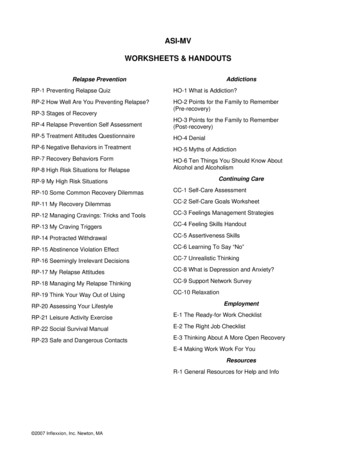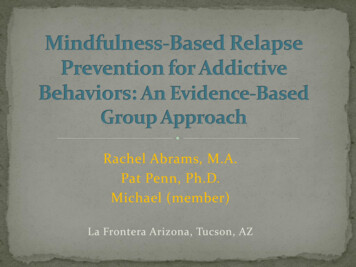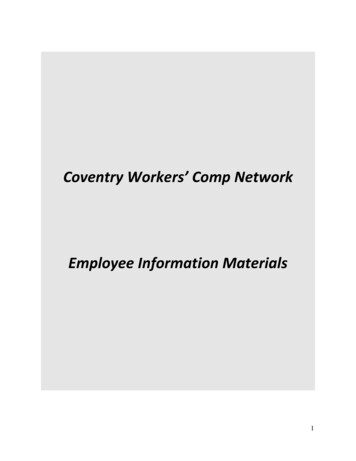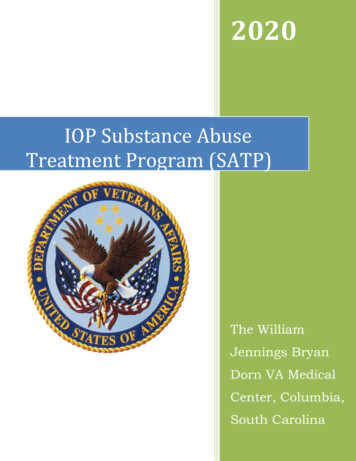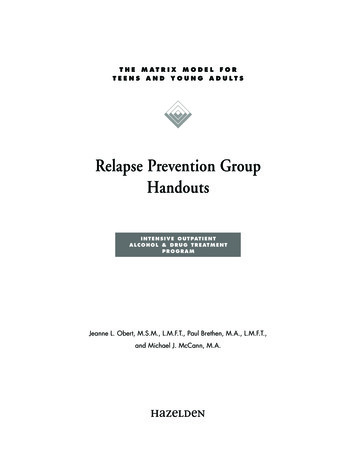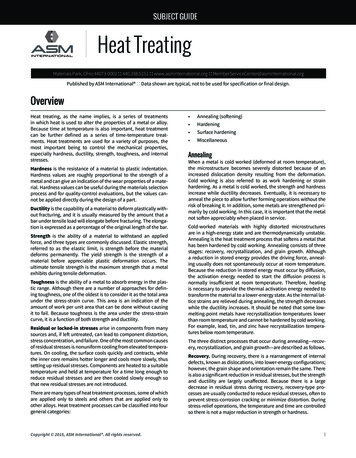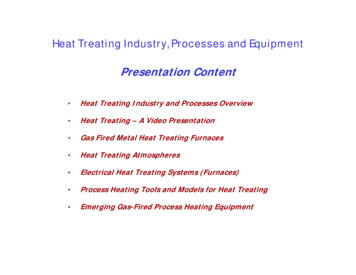
Transcription
Treating the Relapse ProcessUsing MindfulnessPresented by:Christopher Shea, MA, CRAT, CAC-AD, LCCApril 11, 2018
Thomas Durham, PhDDirector of TrainingNAADAC, the Association for .org
Produced ByNAADAC, the Association for Addiction Professionalswww.naadac.org/webinars
www.naadac.org/webinars
www.naadac.org/relapse-mindfulness-webinar
CE CertificateCost to Watch:FreeTo obtain a CE Certificate for the time you spent watchingthis webinar:CE Hours Available:1 CEs1.Watch and listen to this entire webinar.CE Certificate forNAADAC Members:Free2.Pass the online CE quiz, which is posted atCE Certificate forNon-members: 153.If applicable, submit payment for CE certificate or joinNAADAC.4.A CE certificate will be emailed to you within 21 days ofsubmitting the quiz.www.naadac.org/relapse-mindfulness-webinar
Using GoToWebinar – (Live Participants Only) Control Panel Asking Questions Audio (phonepreferred) Polling Questions
Webinar PresenterChristopher Shea, MA, CRAT, CAC-AD, neyYourLife Coaching, LLC
Webinar Learning Objectives12Define relevant termsas discussed in thewebinar.Explain the connectionbetween mindfulnessand the on-goingrecovery process.3Formulate an individualizedtreatment plan of actionbased on mindful meditation
take away .increased awareness andknowledge on the importance ofstaying in the moment for ahealthy recovery
We live in a society which is . filled with movement filled with distractions filled with noise filled with mediafilled with instant gratification throughtechnology
People working on healthy recovery need . support from othersfeeling of connectednesschange in behaviors and thoughtsIn a world filled with noise and instant gratification,how can we expect a person in early recovery toheal in a healthy way?
through the use of .mindfulness techniques&meditation
Research indicates mindfulness is effective"theoretical computer scientist Yariv Levy and colleagues suggest thatrehabilitation strategies coupling meditation-like practices with drug andbehavior therapies are more helpful than drug-plus-talk therapy alone whenhelping people overcome addiction."Levy says, "Our higher-level conclusion is that a treatment based onmeditation-like techniques can be helpful as a supplement to help someoneget out of addiction. We give scientific and mathematical arguments ------------------------------A computational hypothesis for allostasis: delineation of substance dependence, conventional therapies, andalternative treatments, Front. Psychiatry, 19 December2013, doi: 10.3389/fpsyt.2013.00167 University of Massachusetts at Amherst
Substance Use DisorderDr. Jellinek: tolerance, withdrawal symptoms, andeither “loss of control” or “inability to abstain”. Thisdisease exhibits both physical & behavioralsymptoms including: tolerance, physicaldependence, pathologic organ change, loss ofcontrol, compulsion, continued use despitenegative consequences.--Shea, C. (2006). "Alcohol Dependence Treatment: an effective comprehensivepsychosocial management Plan"
A Goal of Recoveryliving with a chronic diseasebut not suffering daily from thedisease
Relapse".the process of becoming so dysfunctional inrecovery that alcohol or drug use seems like agood idea."--Terence GorskiRelapse Prevention a continued level oftreatment to avoid a return to prior patterns--Terence Gorski
Recovery Process1. get stuck in recovery2. deny stuck point3. use other compulsions to handle pain4. vulnerable to a trigger event5. as problem grows lose control6. using of alcohol or drugs # 1-5 relapse process # 6 active addiction--Terence Gorski
MindfulnessRooted in Buddhist traditions that emerged thousandsof years ago, the modern mindfulness movement inthe West was largely sparked by the work of JonKabat-Zinn, who developed Mindfulness-Based StressReduction (MBSR) programs at the University ofMassachusetts Medical School, starting in 1979. Hiswork was initially focused on helping patients deal withchronic pain. By adopting a mindful approach to pain,Kabat-Zinn found he could relieve mental distress andimprove functioning overall.--Gregg Henriques, PhD "What is Mindfulness & Does it Work?
“ mindfulness became integrated incognitive and behavioral approaches.Some prominent ones includedapproaches such as Marsha Linehan’sDialectical Behavior Therapy, SteveHayes and colleagues’ Acceptance andCommitment Therapy, and Segal andcolleagues’ Mindfulness-Based CognitiveTherapy.“--Gregg Henriques, PhD "What is Mindfulness & Does it Work?
Living in the Present Moment“ a means of payingattention in aparticular way; onpurpose, in thepresent moment,nonjudgmentally.”--Jon Kabat-Zinn
CONTROLStress and anxietycaused by the unknownand a lack of controlPAST can no longercontrol itFUTURE cannotcontrol all of futureeventsPRESENT I can controlmy thoughts & actions
“Men are disturbed not by things, but by the views which theytake of them.” – Epiclius in 1st century AD
- Cognitive misperceptions can lead to unhealthybehaviors. When an individual experiences astressful event, automatic thoughts come to mindand can lead to negative moods and emotions.- Cognitive behavioral therapy is a widelypracticed psychotherapy based on the theorythat it is not actual events that cause ourproblems and various disorders, but the meaningswe give to the events.
Meditation
Harvard Study on MeditationAn eight week studyconducted by Harvardresearchers at MassachusettsGeneral Hospital (MGH)determined that meditationliterally rebuilds the brainsgrey matter in just eightweeks. It’s the very firststudy to document thatmeditation produces changesover time in the brain’s greymatter.
“This study demonstrates that changes inbrain structure may underlie some ofthese reported improvements and thatpeople are not just feeling better becausethey are spending time relaxing.”– (1) Sara Lazar of the MGH Psychiatric NeuroimagingResearch Program and a Harvard Medical SchoolInstructor in Psychology
National Center for Complementary &Integrative Health- Meditation is a mind and body practice that has a long history of use forincreasing calmness and physical relaxation, improving psychological balance,coping with illness, and enhancing overall health and well-being. Mind and bodypractices focus on the interactions among the brain, mind, body, andbehavior.- Many studies have investigated meditation for different conditions, andthere’s evidence that it may reduce blood pressure as well as symptomsof irritable bowel syndrome and flare-ups in people who have hadulcerative colitis. It may ease symptoms of anxiety and depression, and mayhelp people with insomnia. Meditation also may lower the incidence, duration,and severity of acute respiratory illnesses (such as influenza).
Thank You!Christopher Shea, MA, CRAT, CAC-AD, neyYourLife Coaching, LLC
ReferencesDavis, FNP, Kathleen. Cognitive behavioral therapy (CBT): how does CBT 79.phpDiClemente CC, et al. "Readiness and Stages of Change in Addiction Treatment," American Journal of Addiction(March–April 2004): Vol. 13, No. 2, pp. 103–19.Frankl, V. E. (2011). Man’s Search for Ultimate Meaning. Random House.Gorski, Terence, How to Start Relapse Prevention Support Groups. Herald House /Independence Press, MO.1989Gorski, Terence, The CENAPS Model of Relapse Prevention Therapy. Printed in: Approaches to Drug AbuseCounseling, National Institute on Drug Abuse, National Institutes of Health, 2000;Henriques, PhD, Gregg. What Is Mindfulness and How Does It t-work
ReferencesJellinek, Elvin, MD, The Disease Concept of Alcoholism. Yale Center of Alcohol Studies. 1960Kabat-Zinn, J. (2006). Coming to Our Senses: Healing Ourselves and the World ThroughMindfulness. Hyperion.Langman, L., & Chung, M. C. (2013). The relationship between forgiveness, spirituality, traumaticguilt and posttraumatic stress disorder (PTSD) among people with addiction. The PsychiatricQuarterly, 84(1), 11–26.Shea, C. (2015). Mindfulness: moving from isolation of addiction to a reconnecting in recovery.The Sober World. 4(9): 16.Shea, C. (2013). The Spirituality of Connectedness: Response to the Stress Reactions inSubstance Abuse Counselors. Advances in Addiction & Recovery. 1(2): 18-19; 21.
ReferencesShea, C. (2006). Alcohol Dependence Treatment: an effectivecomprehensive psychosocial management Plan. Advances in AddictionTreatment, 1(1), 12-14.University of Massachusetts at Amherst. (2013, December 29). "In addiction,meditation is helpful when coupled with drug and cognitive therapies, studysuggests." Medical News Today. Retrieved 1.
www.naadac.org/relapse-mindfulness-webinar
CE CertificateCost to Watch:FreeTo obtain a CE Certificate for the time you spent watchingthis webinar:CE Hours Available:1 CEs1.Watch and listen to this entire webinar.CE Certificate forNAADAC Members:Free2.Pass the online CE quiz, which is posted atCE Certificate forNon-members: 153.If applicable, submit payment for CE certificate or joinNAADAC.4.A CE certificate will be emailed to you within 21 days ofsubmitting the quiz.www.naadac.org/relapse-mindfulness-webinar
Upcoming WebinarsMay 23, 2018April 25, 2018Ensuring Fidelity to Motivational Interviewing amongFrontline Service ProvidersBy Ben Callaway, LMSW and Nicole Chisolm, MPHJune 13, 2018May 8, 2018Intergenerational Trauma and the Healing Forest ModelBy J. Carlos Rivera, CADCIIITherapeutic Considerations ofPsychopharmacology for Opioid Use DisordersBy Linda Shaffer, MA, ED.S, LCASwww.naadac.org/webinars
www.naadac.org/webinars
WEBINAR SERIESINDEPENDENT STUDY COURSESOver 145 CEs of free educationalwebinars are available. Educationcredits are FREE for NAADACmembers.Earn CEs at home and at your ownpace (includes study guide andonline examination).CONFERENCESMAGAZINE ARTICLESNAADAC Annual Conference, October 6-82018, Houston, TXwww.naadac.org/2018annualconferenceIn each issue of Advances inAddiction & Recovery, NAADAC'smagazine, one article is eligible forCEs.CERTIFICATE PROGRAMSFACE-TO-FACE SEMINARSNAADAC offers face-to-faceseminars of varying lengths in theU.S. and abroad.www.naadac.org/educationDemonstrate advanced education in diversetopics with the NAADAC Certificate Programs: Recovery to Practice Conflict Resolution in Recovery National Certificate in Tobacco TreatmentPractice
Thank you for joining!NAADACorgNAADAC44 Canal Center Plaza, Suite 301Alexandria, VA 22314phone: 703.741.7686 / 800.548.0497fax: 703.741.7698 / AADAC
Shea, C. (2015). Mindfulness: moving from isolation of addiction to a reconnecting in recovery. The Sober World. 4(9): 16. Shea, C. (2013). The Spirituality of Connectedness: Response to the Stress Reactions in Substance Abuse Counselors. Advances in Addic


